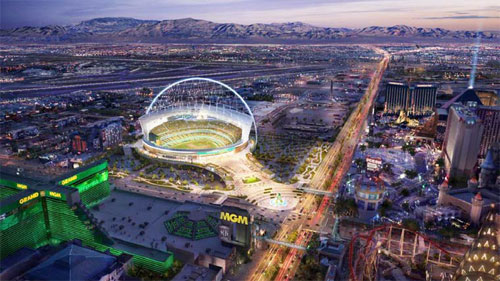Brice Wallace
Expansion is happening in Major League Baseball. It’s just not the expansion a group of Utahns would want to see.
While MLB has talked about boosting the number of its teams, the list of cities expressing interest in having an expansion or relocated team continues to grow.
Fresh on the heels of a Utah coalition announcing plans to get a team in the Beehive State, a group in Orlando unveiled a proposal for a 45,000-seat stadium there, building on a hope announced in 2019 that the mid-Florida city could someday get{mprestriction ids="1,3"} an MLB team.
Orlando joins Salt Lake City; Portland, Oregon; Nashville; Charlotte and Montreal as cities that have expressed interest in a big-league club or are considered among MLB’s best options for relocation or expansion. The Oakland Athletics, meanwhile, are in the midst of a move to Las Vegas.
Expansions or relocations are rare in baseball, and MLB has expressed a desire to resolve stadium issues for the Athletics and the Tampa Bay Rays before considering whether to expand to 32 teams.
The Orlando stadium proposal was made May 9 by Orlando City Baseball Dreamers LLC, which envisions a clear-dome stadium on a $1.7 billion project across 35.5 acres. The project would include retail shops, restaurants, office space, 1,000 hotel rooms, and parking garages. Leading the effort is Pat Williams, founder and president of the LLC and co-founder of the Orlando Magic of the NBA.
Big League Utah is a coalition of Utah leaders working to get a team for the state. They envision a ballpark on Rocky Mountain Power’s 100-acre Power District Project between Salt Lake City and the Salt Lake City International Airport.
A few days ahead of the Orlando stadium proposal unveiling, Steve Starks, CEO of the Larry H. Miller Co., listed several advantages Utah has over other markets competing for a team. At the One Utah Summit, he presented the case “why we believe that we should feel confident” about Utah landing a relocated or expansion team.
Much as a great baseball player has five “tools” — the ability to hit, hit with power, run, field and throw — Starks described Utah as a “five-tool player” as a Major League market:
- The state is growing, with a young population. It features a top-30 media market, is the nation’s top job-growth state, and it outperforms similar markets in ticketing and sponsorship revenue.
- The state’s economy is the best in the U.S., with historically low unemployment; a business-friendly environment; the highest median income of potential expansion markets; and the highest rate of probability for “unicorns,” defined as startup companies with a valuation over $1 billion.
- The state is the “Crossroads of the West,” which makes it a natural crossroads for teams traveling across the U.S., especially the West. It also features a Delta Air Lines hub and the newly renovated and expanded Salt Lake City International Airport.
“Salt Lake is the ideal geographical fit for Major League Baseball to expand,” Starks said.
- Utah has experience hosting major sports teams and events, including the 2002 Winter Olympic Games, two NBA All-Star Games and two Triple-A ball All-Star Games.
“We are a state of sport … and that allows us to be considered, I think, around the country as one of the markets that can support an MLB team, should they come here,” he said.
- Utah has great quality of life. “We like to think that the most family-friendly sport could come to the most family-friendly state,” Starks said.
Utah has “a lot of great momentum and stories to tell,” Starks said. Among other advantages are being a community that embraces faith and family, that values inclusion and diversity, and is a place where people want to come.
“And that’s not lost on Major League Baseball as well,” he said. “When you compare us to other markets — and we’ll never disparage other markets because there’s incredible cities across the country — but we have competitive advantages that are both tangible and intangible, and we should absolutely own those things.”
So far, Big League Utah has members from throughout government, politics, the business world and the community, and he said more will join.
“I can tell you that there’s other names on our partner coalition that we haven’t announced yet, but we will, that are very excited about it,” Starks told the summit crowd. “And our view of the world is, this is going to take all of us to work together, and so we want to build a very robust, diverse and inclusive coalition to get it done, and we’re going to need your help as well.”
Major League Baseball team expansions first took place in 1961 and 1962, when two teams were added each of those years. Four more teams joined in 1969. Two teams were added in 1977, 1993 and 1998.
But team relocations have become rare. Only one franchise has moved since after the end of the 1971 season, when the Washington Senators became the Texas Rangers. That happened in 2005, when the Montreal Expos became the Washington Nationals.
There have been several near-moves, as the San Diego Padres almost shifted to Washington, D.C., and several teams — including the San Francisco Giants and Chicago White Sox — eyed Florida before ultimately remaining in place.{/mprestriction}








